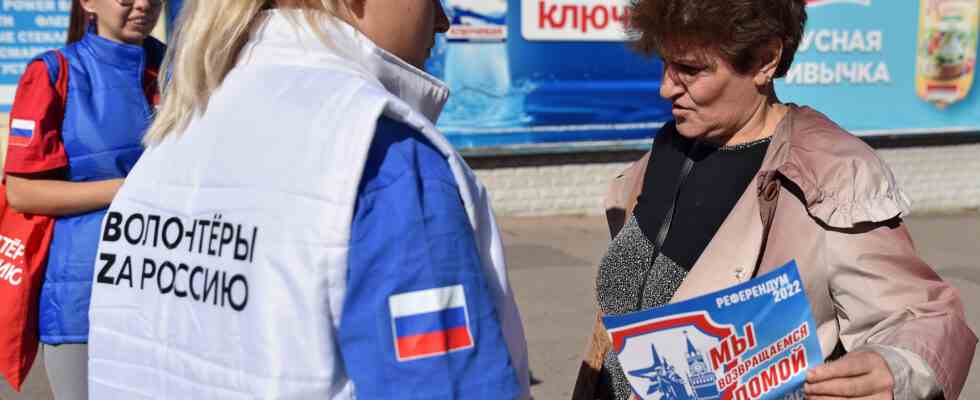background
Status: 09/23/2022 03:39 a.m
Starting today, Russia wants to hold mock referendums lasting several days in occupied areas of Ukraine. Four regions are to become part of Russian territory. The votes have no substance under international law, experts emphasize.
From today until Tuesday evening, “referendums” on joining the Russian Federation are to be held in four Russian-occupied regions of Ukraine. At the beginning of the week, Russian state media announced, referring to the occupation administrations there, that they had asked the Kremlin for “help” in holding such sham votes.
Around 15 percent of Ukraine’s territory is affected in the regions (oblasts) of Donetsk and Luhansk in the east and Cherson and Zaporizhia in the south of the country. In Donetsk and Luhansk, Moscow had been using pro-Kremlin armed groups to push for a secession into self-proclaimed “people’s republics” since 2014 and recognized them as separate states at the end of February 2022, three days before the Russian invasion of Ukraine. The city and region of Cherson have been occupied by Russian troops since March, while the city of Zaporizhia and parts of the region are under Ukrainian control – but the Kremlin wants the result expected next week to apply to the entire region.
Shaded in white: advance of the Russian army. Shaded in green: Russian-backed separatist areas. Crimea: annexed by Russia.
Image: ISW/09/21/2022
International lawyer speaks of “perversion”
Ukraine and the majority of countries around the world had previously condemned the mock referendums as a violation of international law and as a move by the Kremlin motivated by power politics. French President Emmanuel Macron called it a “parody,” while White House National Security Advisor Jake Sullivan called it an “affront to the principles of sovereignty and territorial integrity.”
International law experts also emphasized that the “referendums” have no legal validity internationally. It is a “perversion” of a legitimate instrument for self-determination, explained Maximilian Bertamini, who is doing his doctorate at the Institute for Peacekeeping Law and International Humanitarian Law (IFHV) at the University of Bochum: “It is used to actually stabilize territorial gains in an illegal war of aggression. “
“There is a lot to criticize from a legal point of view,” Maximilian Bertamini, international law expert at the University of Bochum, on bogus referendums
tagesschau24 2:00 p.m., 22.9.2022
There are several problems with the votes – “starting with the fact that Russia, as the occupying power in eastern Ukraine, is not allowed to allow votes on territorial changes at all,” he said tagesschau24. Important framework conditions for the validity of referendums are also not given: “Voting must be possible in general, equally, without the exercise of coercion or without offering rewards or the like”. In addition, referendums must be preceded by a certain period of time in which a social and political discourse on the issue can be held in the voting community. Finally, recognition of the results produced by large majorities in other states, which is important for legitimacy under international law, is not to be expected.
Parallels to the sham referendum in Crimea
The sham referendums in the four regions had long been intended by the occupying regimes set up by Russia, but they were then scheduled to be carried out in a hurry. A free debate is not possible there under the conditions of continued fighting and restrictive occupation administrations – just as not a free vote that would be verifiable by independent observers. In Donetsk, the vote will be held door-to-door for the first few days “for security reasons,” according to the local occupation administration. Polling stations would only open on the last day of voting, September 27.
With the annexation of Crimea in 2014, Russia had already acted similarly, albeit more covertly: fighters without badges under Russian command had occupied the peninsula, largely sealed off communications and transport traffic and staged a “referendum” there on accession to Russia. Since the spring of 2014, Ukraine has de facto no longer controlled Crimea, which Russia has unilaterally treated as its territory ever since.

